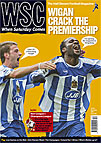 "A case of anything goes." Gavin Willacy looks at the laws of yesteryear
"A case of anything goes." Gavin Willacy looks at the laws of yesteryear
There seemed to be little unusual about the game at first. Twenty men of assorted shapes and ages, indulging in a ragged Sunday kick-about on the outer fringes of a south-west London marshland, shooting at goals without crossbars let alone nets, no corner flags or referee, wearing an assortment of knee-length trousers and footwear of varying suitability.
It was the camera crew and the presence of British television’s cultural president Melvyn Bragg that set it apart from the handful of other amateur games taking place in the rain. This was football 1863-style, as Barnes and Richmond re-enacted the first ever game to be played under the FA’s rules, between those very clubs, at this very venue, 142 years ago.
The reason for Bragg’s presence, suitably attired in flapping mac and flat cap? He’s presenting an ITV1 series Twelve Books That Changed The World and among the dozen is the first rule book of the Football Association. “That little book totally changed the world,” claims Bragg, a Carlisle United fan and Arsenal season-ticket holder. “Before then, football had been played in public schools and in the streets – great gang warfare that was banned for 200 years because it was so violent.”
With each establishment using different rules, including Rugby School’s running with the ball (leading to the William Webb Ellis myth), competition was impossible. So ten London clubs met at the Freemason’s Arms in Covent Garden and, over a series of six meetings, drew up the rules. Melvyn again: “So few people played football – just a bunch of public schoolboys. The rest of the country had a pig’s bladder and used it as an excuse to knock the hell out of each other. The brilliance was putting it into a set of rules. It went round the world in about 20 years: British sailors, ambassadors and merchants took it to Brazil, Russia, Paraguay and Uruguay, and foreigners came to this country and took it back with them.”
The 2005 version of the Victorian game is frantic and amusing, and from a distance looks no different to the rest: speculative hoofs upfield, determined dribbles through long grass and snap shots at goal from unfit fellas unaware of the time and space they had at their disposal. The heavy, large ball makes accurate lofted passes rare and heading dangerous. But the 1863 rules took that into account. “The only handling allowed here is if the ball comes in the air you can catch it and make a mark and then you have to start the play by kicking again,” explained a clearly enthused Bragg. “Otherwise we’re well on the way to soccer.”
With no real goalkeepers – just a man stood between the sticks – it was like a playground game of “fly keeper” with no penalty area. Unlike the original, which ended goalless, Barnes, who are amateur footballers, snatched a 3-3 draw with Richmond’s converted rugby players. “There was no structure and a lack of pauses, which made it knackering,” said Richmond full-back Tim Cook. “The high balls, collisions and sliding tackles made it pretty dangerous, too. It was a case of anything goes, really.”
One old rule that didn’t last long was “first come, first serves” at throw-ins. Regardless of who it came off, the first player to the ball threw it in (at right angles, like a line-out) leading now to some comical chases. Other entertaining laws worth considering for recall are playing on a pitch up to 200 by 100 yards, abandoning corners for free-kicks at goal, and attackers having to be behind the ball when it’s kicked. This first tentative step towards the offside rule clearly did not register with the 2005-era players and, with no referee to clarify matters, was seemingly ignored as the game progressed.
There was, though, no sign of anyone breaking the strict ban on “projecting nails, iron plates or gutta percha on the soles or heels of boots” (gutta percha was a rubbery resin from Malaysian trees used to insulate wire). Swapping ends after every goal was also soon abandoned, thankfully. The 1863 rules would be pasted on the side of a shed by the pitch for the players to read aloud to each other and learn. Something some high-profile Premiership managers and players could do with, given their often ignorant post-match comments about refereeing.
From WSC 226 December 2005. What was happening this month